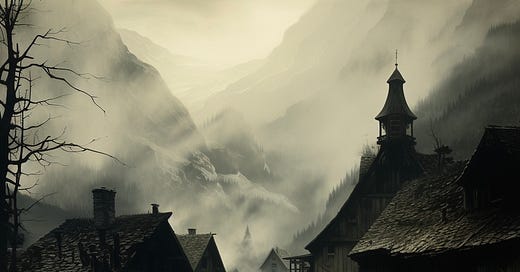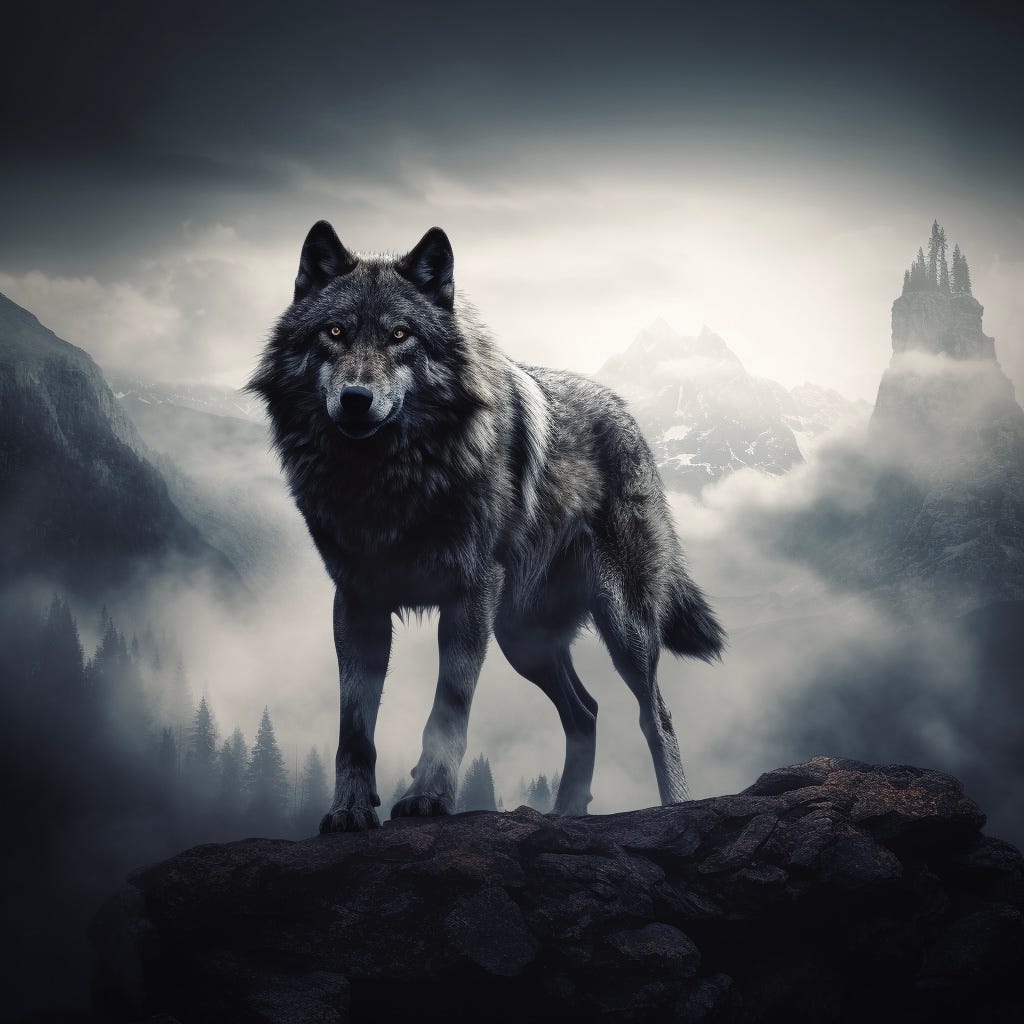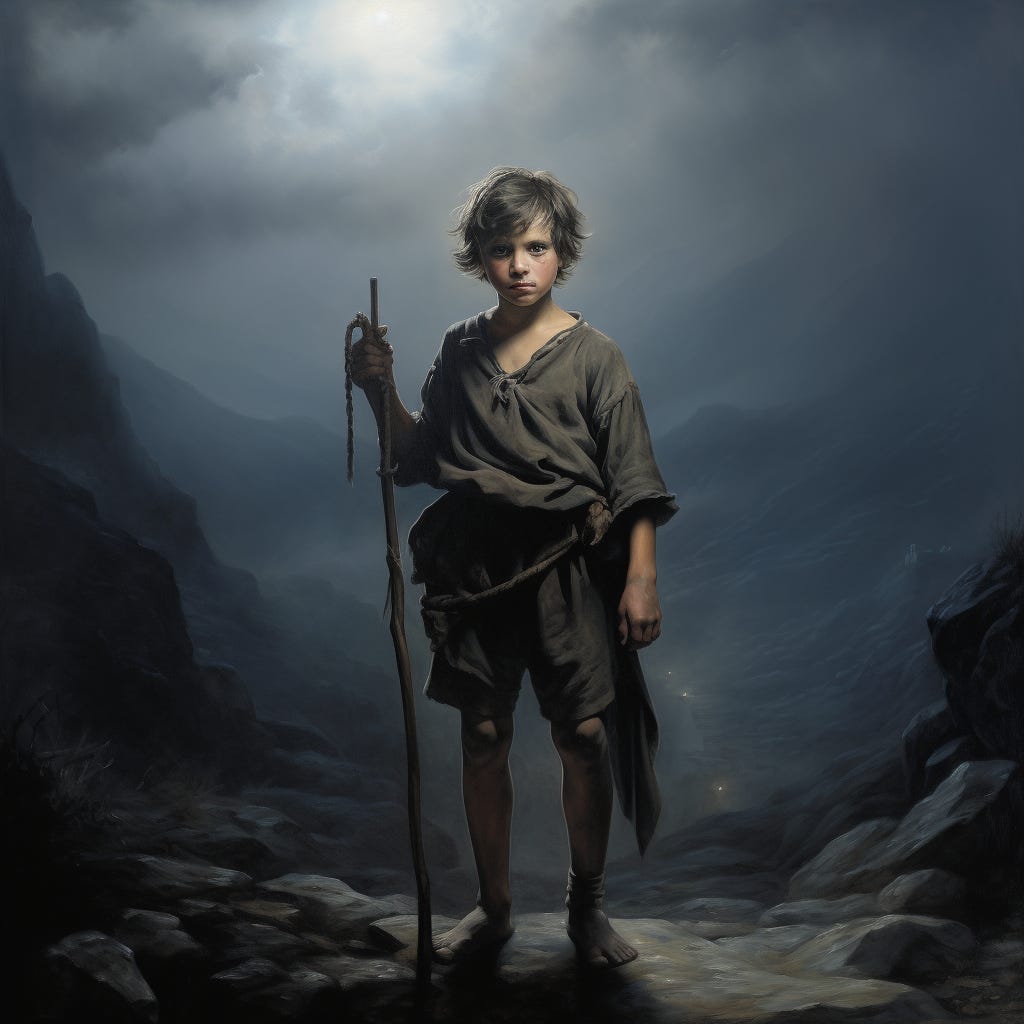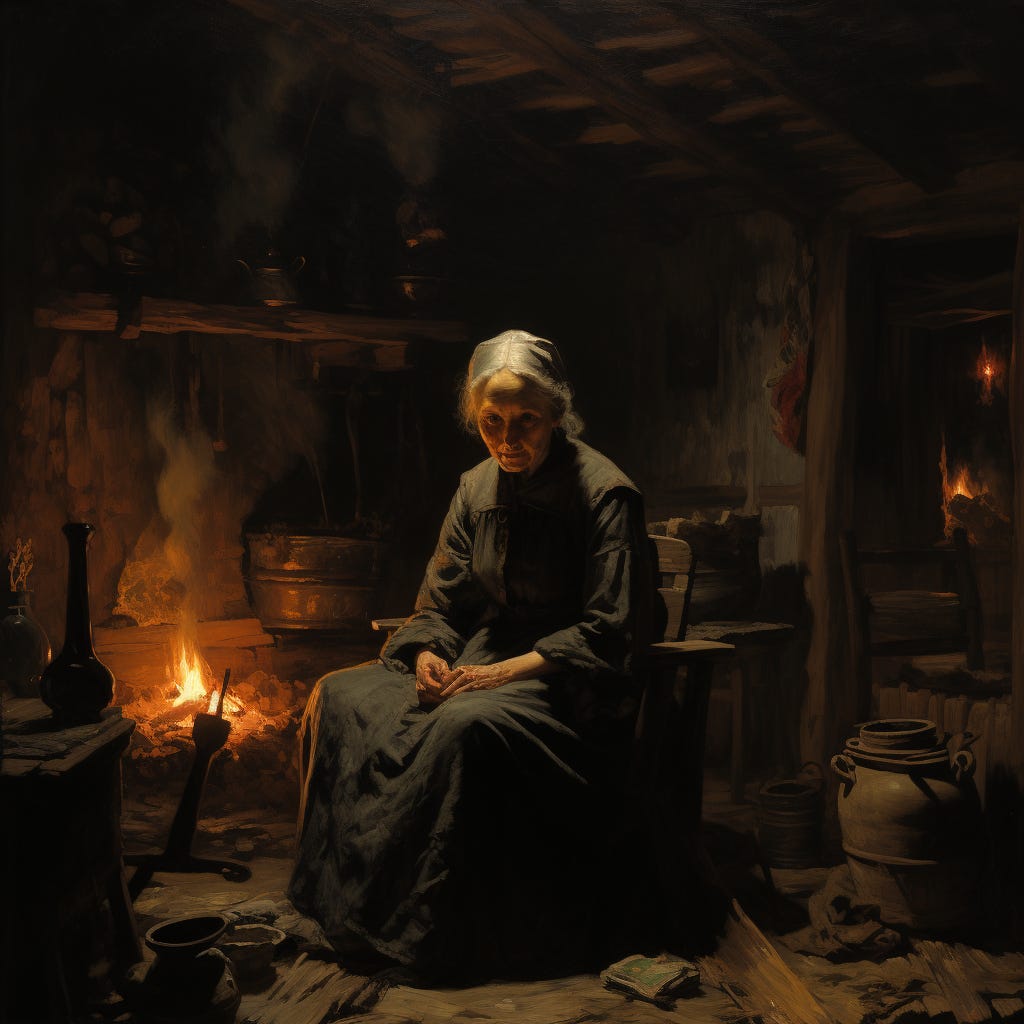Book I, Chapter 1: Mariahilf am Inn
Hermann leaned into the fierce winds with his only surviving child at his side, a girl in pigtails named Gudrun. The blizzard swept through the dark canyons of the Sierra Nevada. The two had no more fuel, no food, and the temperature continued to plummet. Knowing she was about to die, his second wife had collapsed hours before in an icy grotto. In despair, she had suffocated her infant son. Her last words, spat out in bitterness and scorn, were, “You’ve killed us all by bringing us to this godforsaken land.”
There had been no time for Gudrun to mourn the passing of her mother or baby brother. Between groans and lamentations, the girl accepted the strips of cloth Hermann tore from her mother’s corpse. She wadded them up and stuffed them into the satchel slung over her shoulder. They left the bodies in the rocky grotto because they had neither the tools nor energy to dig a grave.
There were many foolish mistakes for which Hermann blamed himself. It had been he who had purchased the damned map from the swindler in Carson City—a map allegedly drawn up by scouts under the employ of the millionaire Astors. The map had a meticulous legend and had even been printed in German. It seemed authentic. And for three weeks, as October passed into November, Hermann had confidently guided his family through a labyrinthine network of defiles and dried creek beds that ran along a vague route the map claimed to be a shortcut to the perpetually sunny vales of California.
Now that Ada and his infant son were dead, Hermann sought only to ensure that his adopted daughter, Gudrun, made it out of this hell alive. Silently he prayed: “O Mariahilf (Our Lady of Mercy), grant me, sinner that I am, this last wish . . .”
A glimmer of hope broke in on their joint despair, when, at sundown, Gudrun had espied what appeared to be a trodden path. Nearby was a cracked sign nailed to a tree indicating that a mining town lay less than twelve miles away. They summoned what strength they had to press on. But both knew they would never make it without food or shelter.
Rounding the wall of a wrinkled cliff, they came to a dip in the path. The grisly sight confronting them caused Gudrun to scream. Although the girl had grown inured to the horrors of the American West, she had not expected to see it on such ghastly display in the pale moonlight.
Before them lay a frontiersman, supine in the snow. The man had frozen to death. His hair and beard were matted with ice. Hermann bent down and rifled through the corpse’s pockets and pouches. He found a half-chewed strip of jerk meat wrapped in a greasy cloth. On the man’s right hip was a Finnish knife in a sheathe.
He drew the knife out and held it bare in his right hand. Hermann’s own knife had slipped from his fingers days before when he had stumbled on the ice. It had clattered over the edge of a ravine, but he had kept the empty scabbard. The new blade fit into it neatly. Hermann knew that he would have to cut off the tips of his frostbitten fingers. He hoped the girl’s limbs had not also become morbid.
As he considered, he cast a quick glance at her. Gudrun could go no farther. If they did not find shelter for the night, they would perish as surely as the man at their feet. They had passed a low-slung cave a few yards back, which Hermann presumed to be an abandoned wolf den. His eyes had taken in the remains of animals scattered around its entrance. In the snow’s reflected light, he had seen no scat, which suggested the den was no longer inhabited.
He seized Gudrun with both hands. Between his chattering teeth, he spoke in German: “We must go back to that cave around the corner. We’ll sleep inside it. If we don’t, we’re going to freeze to death.”
“But Papa! What if there are bears or wolves in it!”
“It’s too small for bears. And the wolves no longer live there. If they did, they would’ve eaten this man’s carcass.”
The girl wept in her extremity as Hermann scooped her up into his arms. He bore her through the mounting drifts; and when they had reached the cave, he put her back down onto her feet.
When Gudrun saw the bones of the rabbits and a frozen mass of feathered remains, she said, “I’m afraid something terrible will happen if we go in there.”
“Nothing will happen so long as I’m with you.”
Gudrun did not want her father to think she was a coward. If anyone had been a coward, it had been her mother for murdering her baby brother. The girl crouched under the overhang and, with her clenched fist, wiped the icicles away. Hermann fell to his knees and tugged her coat.
“I’ll go first,” he said.
“No, I’ll do it.” She elbowed him back. Slowly, she crawled inside. Now that she was out of the howling wind, she could breathe without the sensation of needles pricking at her lungs. She heard her father behind her, moving over the cracking ice that had formed on the cave’s floor. He touched her heel by accident, and this made her scream.
“I’m sorry,” he said.
Gudrun stopped. “Papa, it’s so dark; and the ceiling is so low. I’m afraid to go any farther.”
Hermann bent his neck round and regarded the pale oval of light where the entrance was. “We’ll sleep here—”
“Papa,” Gudrun whispered breathlessly.
“What?”
“There’s something next to me.”
Without a word he rolled onto his back, seized Gudrun by the waist and dragged her over his chest until she had been moved to the other side of him. Then, with his right hand, he drew the knife from the scabbard and extended it toward where she had been. There was nothing there.
He scooted deeper into the darkness on his elbows. The ceiling of the cave scraped against the top of his head. Gudrun begged him to be careful. The tip of the knife made contact with something. He jabbed the blade into it. It was an inert mass. He cut at it and there was a tearing noise, like the sound of burlap ripping. Since his fingertips were frozen, he patted the thing with his left palm. The fur was cold and stiff.
“It’s a dead wolf,” he said.
He felt the rigid teats and presumed it to have been a she-wolf. Next to the carcass were three clumps like withered turnips. The cubs had died with their mother; the cold, dry air in the den had mummified them all. An old memory stirred at the back of his mind. This was too much of a coincidence. But he dared not share his concerns with the girl. His voice was emotionless. “We need to sleep.”
But already Gudrun had passed out, clinging to his back. He removed the Finnish knife and plunged it into the wolf’s carcass so that he would not accidentally cut himself or her in the night. Then he rolled over and faced the girl, pulling her head under his chin and clenching his fist around each pigtail in an effort to melt the ice caked between the braids.
If they died in their sleep, it would be tragic but more merciful than perishing in the snowstorm. If Gudrun awoke and found Hermann dead, he was confident the girl’s instinct would prevail and that she would have the sense to consume either his flesh or the flesh of the dead frontiersman to complete her journey to the mining town. He was about to reach into Gudrun’s shoulder satchel to extract the cloth he had torn from his Ada’s corpse as added insulation to help keep them warm when he heard it again: that faraway ghostly howl. Even if Gudrun had been awake, she would not have heard. No one but he ever had.
It is as if I walk the earth with the mark of Cain on my back. How many souls have perished because of me?—No! Not because of me. Because of the werewolf.
The sequence of events, which had begun almost forty years ago in that sleepy Tyrolean village of Mariahilf am Inn, seemed to be culminating in a final catastrophe.
The curtain is about to fall. . .
He had been only ten when the incident occurred. It had been his custom to rove barefoot through the rolling foothills of the mountain valley when his chores were done. The path he followed back down was never the one he had followed up. Each bump, each dip in the ground were so familiar that he walked without the aid of a torch or lantern, even when the night was plunged in utter darkness.
But on that spring evening, as the full moon rose between two jagged peaks, he found himself on a less familiar path. There was a sound around the bend to the right: a chorus of canine whimpering. With one hand on the rocks he peered around the corner. At the edge of a cliff lay a she-wolf nursing four cubs. He knew how protective wild animals could be around their young, though they generally kept aloof from humans if they were left unmolested. But this she-wolf did not even seem to notice Hermann. There was something wrong with her. Her limbs were outstretched, joints locked. She was convulsing. His curiosity was piqued; and he gingerly approached. There was foam issuing from her mouth. She was in her death throes.
Taking pity on the poor beast, he mumbled a prayer to the Virgin Mother and removed his knife. Swiftly and deftly, he cut her throat. When she was dead, he stroked her ears, as one of the pups nuzzled against his thigh. They’ll starve without their mother, he thought. And so he exhaled; and tightening his grip around the haft of his knife, he set about the grim task of slitting the throats of the cubs.
When he was done, he washed the blade in a spring trickling out of the karst rock. Wiping both sides of the steel on his hosen before re-sheathing it. He picked up his walking stick and was about to start his descent when he heard a low growl from behind. He turned and froze in fear.
On a boulder near the cliff stood a massive wolf—a male. The edges of the creature’s lips curled up until its slavering teeth were bared. It turned its attention to the dead she-wolf and her cubs. Swiftly, it leapt from the boulder and landed gracefully near the carcasses, sniffing the mother and her cubs, lapping up the blood from the fur. Then it devoured the cubs, one by one, its jaw distending hideously and consuming each carcass in a single gulp.
Hermann carefully stepped back, intending to flee. But the wolf anticipated this and growled menacingly. It sprang back onto the boulder and circled the top of it. Then something extraordinary happened. The beast stood up on its hind legs and faced the moon. It remained in this stance for some time. Hermann had never seen a four-legged creature stand on two legs for so long. Its tail wagged as it maintained this posture.
Hermann could bear it no longer. In a panic, he sprinted away, flinging his walking stick behind him in the hope that it would slow the wolf’s pursuit. Had it been daylight he would not have tripped on the outcropping of stone jutting up out of the ground in front of him. He fell prone and rolled down a shallow embankment. That was when he first heard the strange howl. It sounded less like a wolf than a man imitating a wolf’s howl.
Jumping to his feet, he looked up at the top of the embankment. He saw the outlines of a man standing in the shadows. The man clutched the walking stick Hermann had discarded. He waved it in a half jocular fashion before casting it down to Hermann where it landed at his feet. The boy picked it up, thinking he should behave as if gratified by this gesture. He tried to show courage by slowing his pace, walking calmly without looking behind him. He racked his brains, trying to work out who the man might be. He wondered if it was a kindly hermit, who lived in the clefts of the rocks. Perhaps it was an angel that had come down from on high to rescue him in his extremity. He could no longer hear the wolf.
But by the time he had reached the floor of the valley, he had rejected these notions. He knew what it was he had seen. He sprinted to the village as fast as his legs would carry him.
He flung open the door to the hovel he lived in. “Papa!” he exclaimed. “I’ve seen a werewolf!”
Hermann’s grandmother sat on a low stool at the hearth, stirring the contents of an iron pot. She turned to face him. The boy had been raised by his father and grandmother when his mother abandoned him shortly after his birth.
In his excitement Hermann recounted his experience on the mountain. When he was done, his father Moritz embraced him. “There’s no such thing as werewolves,” he said.
“Bisch Du sicher (Are you certain)?” Oma Ingrid asked in the rounded accents of the Tyrol.
“You’re scaring the boy,” Moritz said, stroking Hermann’s hair.
That night, Hermann ate his gruel in silence as the two adults exchanged significant glances.
On the following day, Hermann was helping Moritz in his workshop behind the house, when Oma Ingrid called out to them urgently.
The morning was cold and gray; and the intramontane winds were blustery in the valley. Some thirty villagers had gathered before the Mariahilf Church, just across from Moritz’s home.
Many of the small dwellings lining the village’s dirt road were being forced open by men wielding lanterns, pitchforks and clubs. From the direction of the valley came a two-wheeled cart drawn by a single nag. Two young men guided the horse to the center of town. The cart came to rest by the covered well that stood between Moritz’s property and that of the blacksmith.
A knot of men and women formed around the cart, gawking down on its contents. Father Reuss descended the steps of the church and went to the cart. The crowd made way for the old priest, who removed his wide-brimmed hat and wiped his scalp before crossing himself.
Hermann’s maternal aunt, Magda, was among those looking down into the cart. She began to sob. “It’s Ilse! My God! It’s my sister!”
“What?” Moritz asked in bewilderment.
“You did this to her!” Magda shouted, pointing her finger accusingly at Hermann’s father.
The priest held up his hands to silence the villagers. “Magda,” he said. “Ilse has not been seen since Hermann was born.” He drew her attention to the woman in the cart. “This woman is a gitsche (a maiden). Not a strand of her hair is gray!”
“Tell me what has happened!” Moritz screamed. “I must see!”
He threw aside the men who resisted him. They did not want him to see this.
Father Reuss walked back to the church and mounted the steps; and addressed the crowd in the declamatory tone he was wont to use when addressing the congregation from the pulpit each Sunday. “This morning the chandler’s sons were in the foothills laying snares. They found this woman and her three babies murdered. Their throats have been cut. The aldermen and I suspect the killer may be hiding among us, here in the village. We have tasked a group of men to inspect each house, overturn each bed, pry into every cubby hole and trunk until we get to the bottom of this!”
Hermann ran to Moritz, who had glimpsed the contents of the cart and whose eyes were wild. He bent down as if to kiss his son; but instead whispered into his ear, “Do not tell another soul what you told your grandmother and me last night.”
Hermann nodded and stared glumly at the bodies in the cart. The babies had been laid out on either side of the woman’s head. All four corpses were covered by a single white sheet, their faces fringed by the tucks and folds of the cloth. The wounds at their throats were black and swollen.
So this is what Mama looked like, Hermann thought. Her face was beautiful.
Magda tore her hair in rage and glared at Oma Ingrid, who stood near the hovel’s wicket, arms folded.
The sound of heavy boots could be heard pounding on the wooden bridge spanning the river Inn. A red-faced man burst onto the scene and collapsed at the foot of the priest, seizing the hem of his cassock.
“What’s wrong, Guido?”
“It’s Baron Eckhart, the toll master! He’s the murderer!”
The villagers gasped.
“Explain yourself?” Father Reuss inquired.
Guido rose and faced the crowd: “We knocked at his door, because he is a nobleman. But no one answered. And so, in accordance with the aldermen’s directives, we forced our way in. . . My God! The house is littered with bones and cured flesh dangling from hooks. Baron Eckhart has been preying on travelers passing through Mariahilf. He laughingly admitted everything. He’s been eating them!” A woman fainted. “The monster sat on the floorboards as we surrounded him. Between his hands he held a man’s head, whose cheeks and lips he only then began to chew.”
“Then Baron Eckhart killed my sister?” Magda exclaimed.
“Magda,” the priest said, wheeling on the distraught woman. “I told you that, even if Ilse were alive, she could not possibly be the woman in the cart.”
“Unless . . .” Oma Ingrid spoke for the first time. All eyes turned to her. “Unless the rumors are true that Ilse made a pact with the Devil.”
“My sister would have done no such thing!” Magda snapped. “If anyone has made a pact with the Evil One it is you, you witch!”
The villagers crossed themselves and turned to the priest for guidance.
Father Reuss lowered his head and sighed. But one of the young men who had led the horse into town uttered a cry and quailed. The men and women around the cart gasped and moved away. The murdered woman and her three babies were gone. A gust of wind blew the white sheet out of the cart. It floated up over the villagers, high into the sky before it snagged on the corner of the bell tower of the Mariahilf Church.











So excited to read this! Well done on this opening chapter, Daniel. Loving the style, the tone, the depth to everything. You never disappoint!
This is a really intriguing start! Scary, grim, very well written